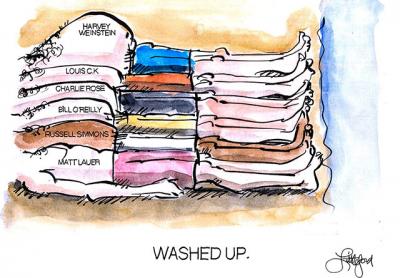South Fork: A Nexus of Powerful Abusers?

Last year, Matt Lauer, the host of NBC’s “Today Show,” appeared in the gossip columns after he was spotted enjoying breakfast at Joni’s in Montauk with Bill O’Reilly, the Fox News ratings king. Last week, as he was being hounded by reporters chasing the unfolding sexual-harassment scandal, Mr. Lauer was photographed near the Long Island Rail Road station in East Hampton in apparent consultation with Edward Burke Jr., a Sag Harbor attorney who had also represented Harvey Weinstein in August, when the beleaguered movie mogul was involved in a parking-lot altercation.
Mr. Lauer, Mr. O’Reilly, and Mr. Weinstein are not the only celebrities accused of sexual misconduct or assault who have houses on the East End; there is also Louis C.K., and Russell Simmons. Another, Charlie Rose, has a place in Bellport, about an hour west of here.
The G-force fall of these powerful men brings to mind a slightly botched Plutarch quote about Alexander the Great: “When Alexander saw the breadth of his domain, he wept, for there were no more worlds to conquer,” spoken by the on-screen German villain in “Die Hard,” one movie not produced by the Weinstein Company.
In cinematic terms, these words conjure epic imagery. There he is, Harvey, or Matt, or Bill the Great, standing atop his balcony like a modern-day Alexander — robe-clad instead of toga-clad — overlooking his vast domain, staring off to the Atlantic’s horizon and considering his life’s achievements. As the gentle wind whips his thinning hair, he weeps for the realization that he has done all a human can do, when an errant gust flings open his robe and . . . oh dear, the pretty young landscaper pruning the roses down below has caught an eyeful.
The East End has always been a sandbox of scandal; that part is nothing new. In 1998, Steven Gaines, a resident of Wainscott, wrote an unapologetically voyeuristic nonfiction book called “Philistines at the Hedgerow: Passion and Property in the Hamptons,” documenting the lowbrow that descended on this once-historical stronghold of blue bloods.
Despite the seeming congregation of the accused here, Mr. Gaines does not believe that the East End is necessarily a nexus of sexual miscreants. “[B]ecause we live in such a wealthy community,” he says, “it just seems that we have a higher concentration, but we don’t. There are sexual predators everywhere, in all towns, in offices, and businesses, we just never hear about them.”
Jim Rutenberg, a media columnist for The New York Times who has written copiously on the subject, also cautioned that there is no need for a celebrity fatwa in the Hamptons. “Sexual harassment is not the province of the wealthy,” he said.
James Gunn, an actor and director, echoed these sentiments in a Facebook post in October, when he wrote that sexual predation is a global problem. “It’s rife EVERYWHERE,” he wrote. “[S]ome men — probably a much larger percentage than any of us want to be true — try to coerce women (or children or other men) sexually. . . . They are movie stars and network heads and world-famous bloggers, but they are also fast food restaurant managers and used car salesmen.”
Rape, Abuse, and Incest National Network, the nation’s largest organization combating sexual violence, states that someone in America is sexually assaulted every 98 seconds. Most commonly it is women and men working in far less glamorous occupations who bear the brunt of lechery and assault: the housekeepers, the gardeners, the caterers, the waitresses, and the receptionists.
Still, it isn’t by mere happenstance that so many of the celebrities who have been accused spend time on the East End. The men in question probably come here, according to Mary Bromley, an East Hampton psychotherapist specializing in the treatment of sexual-assault victims, to be with others like themselves — not just others who are rich and powerful, but, she says, perhaps specifically others whose “money and power mask deep insecurity and hostility.”
“It is interesting,” Mr. Gaines said in a phone conversation this week, “that they do come out here to be under the radar.”
What worries Ms. Bromley most are the powerless in this community —women who might be domestic workers, for instance, or children who might be marginalized — who may have been victims of sexual harassment and abuse but are too fearful to speak up. Not only is it true, she emphasized, that “if you have money and a good lawyer, you can get off, but also that we never hear the stories of female victims who are not celebrities.”
Indeed, as a place where billionaires live side-by-side with needy immigrants and blue-collar service workers, the idea of the Hamptons could be read as grim allegory. It is, after all, as Ms. Bromley and others point out, a power imbalance that most often facilitates abuse. And here, where the streets aren’t actually paved in gold — but paved by an underclass dreaming of it — that imbalance is greatly exaggerated, leaving a swath of the population potentially vulnerable.
“It stands to reason,” said Mr. Rutenberg, of the constellation of disgraced stars. “Sexual harassment is all about power and the abuse of power, and the Hamptons is about the powerful, the ultra-wealthy — a crowd of invincibles.”
